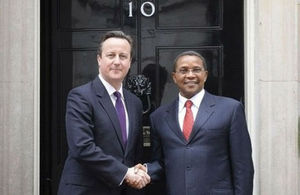Response To Accusations Against The British High Commissioner
British High Commission confirms strong bilateral relationship with Tanzania and next tranche of Budget Support to be paid in July.

British Prime Minister & Tanzanian President
There have been a number of inaccurate statements made recently concerning the UK and the British High Commissioner to Tanzania, including that we are cutting budget support and that the High Commissioner has been encouraging other donors to do the same. The British High Commission wishes to make very clear that this is not the case. The UK will be paying its next tranche of Budget Support of £23.75 million (Tsh 65 billion) in July. We would not want to pre-empt the outcome of the Controller and Auditor General’s investigation into IPTL.
We also strongly refute the extraordinary allegations on social media that the British High Commissioner bribed MPs to sabotage the Ministry of Energy and Mineral’s budget. These are completely untrue.
The UK and Tanzania have excellent bilateral relations. President Kikwete recently made a Guest of Government visit to the UK and had warm meetings with the British Prime Minister, David Cameron, Foreign Secretary William Hague and His Royal Highness Prince Andrew, amongst others. The talks were held in a friendly and constructive atmosphere. President Kikwete and David Cameron welcomed the increasingly significant and strategic partnership between Tanzania and the UK. They pledged to deepen the relationship, building on shared prosperity and security interests, shared history, Commonwealth values, language, law, military doctrine, and close people to people ties.
The UK is the Number 1 investor in Tanzania with 35% share of foreign direct investment. According to the Tanzania Investment Centre, UK companies invested around USD 5.1bn (TSh 8,415,000,000,000/-) in Tanzania in the period 1990-2013 (June), creating 271,000 jobs – almost four times as many as any other investor. Bilateral trade was worth USD 340 million (Tsh 561,000,000,000/-) British firms play an important role in all the major sectors including energy, communications, construction, banking, agriculture, and the nascent oil and gas sector, where the British company BG Group alone has invested in excess of USD 1 billion (Tsh 1,650,000,000,000/-), with substantially more in prospect.
The UK has pledged to help Tanzania achieve middle income status through accelerated and inclusive, private sector led growth. This will be an increasing focus of UK development cooperation in Tanzania, and will include sharing UK experience of public private partnerships and promotion of partnerships between UK and Tanzanian companies to maximise local job creation and develop local skills. Tanzania is one of only five African countries with which the UK has signed a High Level Prosperity Partnership, focussing on 4 priority areas: agriculture, extractives, renewable energy and improving the business environment. We are also working in partnership with the Government of Tanzania to implement a G8/Tanzania Lands Transparency Initiative.
Tanzania is one of DFID’s largest African country programmes. Our development budget for Tanzania for this year alone (2014/15) is £165 million (Tsh 452 billion). Of this figure, £71.5 million (Tsh 196 billion) is direct budget support to the Government of Tanzania. An independent review of donor support to the Government’s budget last year concluded that UK funding had enabled Tanzania to expand services, especially in education and roads, throughout the country, making an important contribution to improving lives and opportunities for poor people.
The UK also does a lot of work on English Language Teaching, Education and the Arts, creating opportunities for young Tanzanians to engage with other cultures and develop international perspectives. This is helping young Tanzanians access the best educational opportunities at home and abroad to improve their skills in preparation for study and work. For example, the British Council has some 300 school links between Tanzania and the UK through which 3,000 school leaders and 30,000 teachers have been trained in 25 hubs around Tanzania. We are also creating opportunities for young Tanzanians to study abroad on scholarship programmes like the Chevening and Commonwealth Scholarship Schemes.
Our relationship with Tanzania is broad and deep, and our commitment is for the long term. We will continue to look for every opportunity to build on the strong partnership we have with Tanzania across an increasing range of shared priorities.